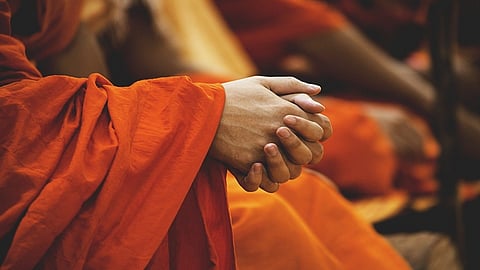

India's proud legacy of its civilisational history would not be complete without the mention of its holy sages and divine thinkers who set an example of how to bring the benefit of spiritual advancement to the man caught in the conundrum of day to day life and who also enriched the human understanding of the universe around us.
It is our thinking saints who could, through their insight into how Mother Nature worked, come out with imperical deductions like there being 'no difference between the seen and the unseen', 'the universe turning into nothingness' or 'time having no beginning or end'. Science's discoveries of conversion of matter into energy, phenomenon of 'black hole' and reversibility of time, respectively prove the effectiveness of Indian thought. Albert Einstein, fascinated by Indian spiritualism, famously said, 'Imagination is more important than knowledge' and this is what the sages in meditation, who made these findings through their deep imagination, proved. Our saints naturally were renunciatory in their outlook, were not drawn to living in the midst of population and were at best 'intermediaries' who helped their followers to acknowledge divine supremacy. They never proclaimed to be God themselves. Their 'ashrams' practised frugality and never attracted notice for wealth and luxurious lifestyle.
It is a matter of concern that India is now infested with many fake godmen who are, if anything, damaging the pristine gift of our ancient civilisation in the form of spiritual guidance provided by the saints and 'sanyasis' whose natural abode was closer to forests and mountains away from the crowded centres of population and who would only occasionally visit their followers in the cities. The 'saints' in the news these days often are those who stood out for the display of wealth and property, attire of gold and diamonds and the most expensive travel and living habits.
One is compelled to recall Tulsidas' description of the class of false 'saints' that Kaliyug -- believed to be the sin-ridden age of today -- would produce. Certainly these fake god men cannot be allowed to smear the civilisational uniqueness of India that produced spiritual guides and thinkers in plenty to enable the society to keep to a value system and pursue both temporal and moral code in life. That quite a few godmen are found to have been on the wrong side of the law in matters like exploitation of minors, money laundering and commission of sexual offences, should give a wake up call to the State to consider ways and means of not letting the precious concept of 'holy men' existing in India down the ages, fall into disrepute and disbelief.
The Indian thought of saints and spiritual guides was so strong that it impacted a prophetic religion like Islam in an extraordinary manner when the two interacted at the turn of the 9th Century. In Islam, there was an absolute separation of man and God and no human being could claim any divine attribute. The aridness of the code of faith, however, produced a desire among the believers in Islam to try to 'feel the presence of God' and this gave rise to Sufism that basically claimed that God could be perceived by human beings, helped by the Sufi saints acting as the intermediary -- a clear impact of Hindu spiritual thought was in evidence here.
Sufism was initially looked upon as the worst sin of 'Shirk' and it is only after many sacrifices had been made by Sufi 'saints' that it got a place under the Islamic umbrella with the stipulation that the Sufi, while acting as an intermediary between man and God, would not claim any divine attribute for himself and would uphold Tawheed or unity of God. It is ironic that many godmen in our society today lose no time in proclaiming that they were God themselves and, what is worse, crassly exploit the emotions of people by peddling instant cures for ailments and mitigation of losses as 'miracles'.
A few points of corrective response from the society suggest themselves. First, while it is true that in the temples of India the deity is worshipped -- the idol being regarded as the visible symbol of God -- and that we have a rich tradition of religious preachers who spoke on the moral guidelines provided in Ramayan and Bhagwat, it would be sacrilegious for a spiritual guide or a holy man to allow the followers to start worshipping him or her as a substitute of God. Protagonists of Hindu religion should speak up against any such attempt. Secondly, no 'Ashram' should have minors inducted there for any reason -- except for their enrolment in the schools sponsored by that religious centre. This should invite attention of the Department of Child Welfare. Thirdly, any report on the commission of a criminal offence by any functionary of the religious establishment run in the name of a godman, should lead to prompt action by the appropriate police authority with arrangements to monitor the possibility of law and o rder situation being created by misguided followers and henchmen.
Fourth, it so happens that in many cases the resources and wealth commanded by a fake god man attracts the patronage of local politicians that acts as a shield of protection against wrong doings of the godman's 'ashram'. These political elements should be handled upfront by the administration as this was not to be mixed up with the issue of management of temples about which an approach of non-interference by the State was in order. And lastly, existence of many fake godmen smears the spiritually deep socio-cultural foundations of India -- their establishments providing refuge to even shady characters can, in fact, weaken the cause of internal security of the country as well. A framework of socio-cultural guidelines evolved by all stake holders should help to check the rise of the phenomenon of fake godmen in India.